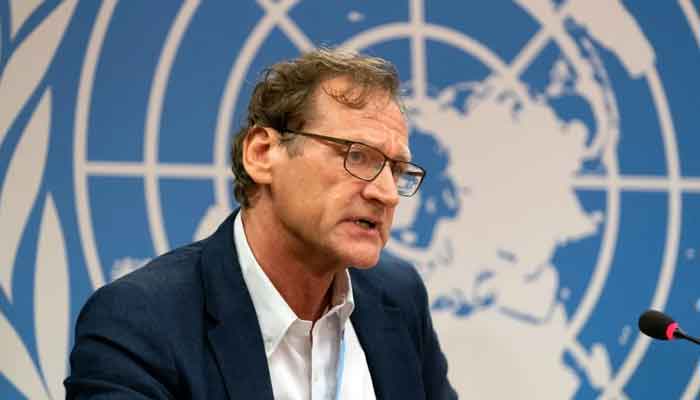Richard Kozul-Wright says that the last debt relief secured by Pakistan in the aftermath of the Covid-19 pandemic from bilateral creditors was just like peanuts 
Richard Kozul-Wright, director of UNCTAD’s globalization and development strategies division, speaks at the press conference for part 1 of the Trade and Development Report 2021. —UNCTAD
October 17, 2023,ISLAMABAD: Visiting Director of the United Nations Conference on Trade and Development (UNCTAD) Richard Kozul-Wright said that Pakistan requires debt relief on external loans in order to secure fiscal space.
He said that the last debt relief secured by Islamabad in the aftermath of the Covid-19 pandemic from bilateral creditors was just like peanuts. He suggested establishing an Independent Debt Authority (IDA) at the international level in order to develop a debt workout mechanism for tackling all kinds of accumulated foreign debt. This can only be done when the creditor and debtor sit together to find out viable solutions.
“There are certain codes in case of bankruptcy. It cannot work until the creditors sit down with borrowers to find out solution. An example of Zambia can be cited where the debt relief process took two years to complete. It’s too slow and too late as well,” the visiting Director of UNCTAD Richard Kozul-Wright said in an exclusive interview with The News here at a local hotel on Monday evening.
The visiting MD of UNCTAD made it crystal clear that Foreign Direct Investment (FDI) was not a charity and would not provide instant solutions to the recipient countries including Pakistan.
He said that Pakistan would have to promote domestic large-scale manufacturing firms to achieve a higher growth trajectory on a sustained basis. He said it was a myth to dwell upon non-debt-creating inflows such as foreign direct investment (FDI) and said that the foreign investors would be required to repatriate their profits and it became problematic for those countries facing a dollar liquidity crunch like Pakistan.
He severely criticised the elite capture and said that the subsidies largely benefited the largest firms so if the subsidies were essential they should be coupled with transparency and discipline otherwise the rich and wealthy would get and run away. In the case of Pakistan, he said that the textile sector managed to get subsidies but without diversifying exports, the country could not achieve a leap forward.
Dwelling upon Belt & Road Initiatives (BRI) undertaken by China, he said that this initiative did not come up in the shape of stringent conditionalities on the pattern of multilateral creditors and the countries would have to equip themselves to get benefits such as climate financing. He said the critical question was how Pakistan was going to diversify its industrial base in order to boost exports. Secondly, he said Pakistan would have to mobilise its domestic resources.
He said that the debt relief obtained by Islamabad in the aftermath of the COVID-19 pandemic from G-20 countries was not sufficient. So the country had to rely upon the IMF’s programme under stringent conditions under the modus operandi of tough austerity measures. It resulted in choking the growth.
He said that China provided debt relief contrary to the claims made by the Western world. He said that Pakistan’s half of resources were utilised for debt servicing and now there was a need that international creditors should come forward to provide breathing space to avert too late and too little.
“The IMF, World Bank, and others should set rules of the game and there is a suggestion to establish Independent Debt Authority in order to work out debt relief mechanism,” he said.
The approach one size fits all would not provide a solution, he said and added that there was a need to promote South-to-South cooperation so that the countries would be able to respond to international shocks such as Pakistan was an import-dependent country for importing fuel so diversified trade, mobilisation of domestic revenues and boosting savings could help Islamabad to earn dollars in medium to long term trajectory. Under the BRI program, he said that China was investing $1 trillion so there was a need to create the right kind of synergies to maximise benefits.








